THE SEVENTH CYCLE OF DELIVERANCE- SAMSON, ONLY A BEGINNING
Chapter 13 begins with the seventh and final repetition of what is now a familiar phrase in the Book of Judges:
“Now the sons of Israel again did evil in the sight of the Lord, so that the Lord gave them into the hands of the Philistines forty years.” (Judges 13:1)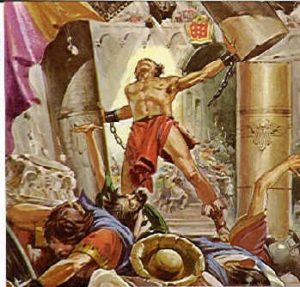
This is the longest period of oppression recorded in the Book of Judges. Samson’s 20-year reign would be DURING the years of Philistine rule (Judges 15:20). The Philistines disarmed the Jews (1 Sam 13:19-23) and the Jews were accustomed to being in bondage to the degree that they did not want Samson to disturb the status quo (Judges 15:9-13). There is no record that the Israelites cried out for deliverance during this period. Yet the very fact that the Son of God would visit the parents of Samson shows that there is an important link to the overarching story of God’s redeeming work recorded in the Bible.
We know that Samson did not deliver the Israelites from Philistine domination. The Son of God prophesied that Samson would begin a work that others would complete.
“he shall begin to deliver Israel from the hands of the Philistines.” (Judges 13:5)
Israel would not be delivered from the hands of the Philistines until the time of David (2 Sam 5:17-25). And the deliverance of God’s people from their greater bondage to sin and death would require the greater Son of David, Christ Himself.
MANOAH’S WIFE
When I casually expressed my disappointment in not knowing the name of Manoah’s wife, my wife responded that if she had a son who behaved like Samson and would be discussed for centuries, she would prefer that people not know her name either!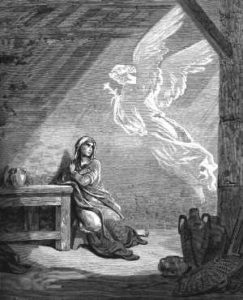
Rarely do we read of a man, who had so much opportunity and power for doing good, make such poor choices and come to such a tragic end. However, God would use Samson’s weaknesses (his self-will, carnal appetites, his capacity to be easily seduced and manipulated by women, and his poor judgment) to deliver the Israelites from the Philistines. He would accomplish more by his death than he did in his lifetime.
Once again, we see the difference between the two aspects of God’s will- God’s moral will of command and His permissive will, otherwise known as His sovereign will of decree. God, in His merciful permissive will, uses Samson’s decisions that violate His revealed will of command in order to ultimately accomplish the deliverance He has decreed.
Samson’s life had a spectacular beginning. His birth was heralded by Christ Himself. His mother was told by the angel of the Lord, a Preincarnate appearance of Christ, that she who was barren would conceive a child. The angel of the Lord, whose name is “Wonderful” (beyond understanding) (13:18), commanded that this child grow up as one who fulfills the Nazirite vow. When Manoah asks the LORD that the man of God who spoke to his wife return to tell him how to bring up his son, the LORD responds with another visitation in which He announces Himself as “I AM” (13:11).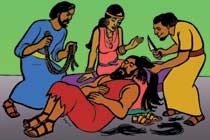
The Nazirite vow was one that was taken for a short period in an Israelite’s life. The Hebrew word, “Nazirite” means “to set apart” or “to dedicate”. Those who took the vow were to dedicate themselves to God and abstain from certain things. They were not to drink of the fruit of the vine, vinegar, or eat any fruit of the vine. He was also not to shave his head or touch a corpse, even if it were a close relative. Samson was called to live the vow until his death (13:7). This was the claim of God upon his life.
The LORD is faithful to His word and Manoah’s wife delivers a blessed child named Samson, meaning “sunny” or “brightness”. The Spirit is said to have stirred in him (13:25). While others in the Book of Judges were clothed with the Spirit (Othniel- 3:10; Gideon 6:34; and Jephthah 11:29) Samson has the unique distinction among them of having it said that “the Lord blessed him and the Spirit of the Lord began to stir him” (Judges 13:24).
The secret of Samson’s strength was not his physical ability. There is nothing said of him having a distinctively strong muscular physique. His strength was in his being set apart to the Lord, symbolized by his unshorn hair.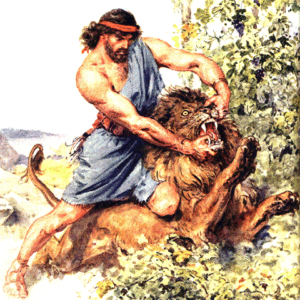
Through the Lord he was able to manifest supernatural strength. This was in evidence when he killed a lion bare-handed (14:5-6). He slew thirty Philistines as part of a bargain to the Philistines who cheated him of the answer to his riddle and asked for thirty coats (14:19). He caught thirty foxes or jackals and somehow tied torches to their tails (15:3-5). He broke free from bonds, be they made of bow string, old rope, fresh rope and loom fabric, even when it is attached to the loom (15:4; 16:9, 12, 14). He slew a thousand Philistines with the jawbone of a donkey (15:15). He uprooted and carried the city gates at Gaza away from the city up to the top of the hill that faces Hebron (16:3). He destroyed the pillars and the magnificent Philistine building that housed 3000 people (16:30).
But Samson is no super hero. Nor is he a model believer.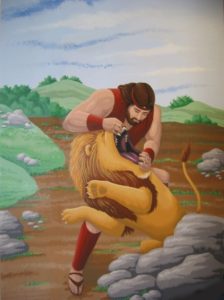
Samson breaks the Nazirite vow in handling the dead carcass of the lion and obtaining honey. He breaks the law of Moses in marrying a Philistine woman and committing fornication (Deut 7:3).
Samson’s story reminds us that God is faithful to accomplish His purposes despite how little cooperation He may find among His people. He is preparing a people to redeem and enjoy for eternity and He can use whomever He chooses towards that end.
At Timnah, a beautiful Philistine woman catches Samson’s eye. Instead of heeding the Word of God, or responding to the Spirit stirring within him, or obeying the counsel of his parents, Samson is driven by his lust and demands to marry her. When he returns to Timnah to make the marriage proposal to the Philistine, he is attacked by a lion. The Holy Spirit empowers him to kill the lion with his bare hands, ripping the lion’s jaws apart. On a subsequent trip, when Samson returns to Timnah for the wedding, he observes that bees have made honey in the carcass. This inspires Samson to invent a riddle to share with the 30 Philistine men appointed to be his companions during the seven-day wedding feast. He promises each of them a fine new linen robe and festive clothing if they are successful in solving the riddle.
Samson’s wife nags him to tell her the answer to the riddle. In what will be revealed as a prevailing pattern of weakness and indiscretion in his life, Samson gives in to his wife’s persistence and tells her the answer. She then shares it with her Philistine compatriots. As a result, Samson must gain 30 linen robes and festive outfits. He kills 30 men in the process. He is furious with his wife and returns home to find that she has been given to the one who had been his best man during the wedding (14:20).
READING FROM THE NEW TESTAMENT: John 1:29-51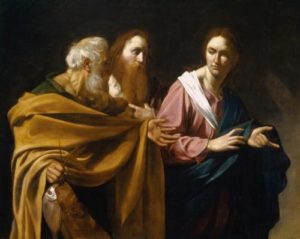
The figure of John the Baptist stands at the hinge of the Old and New Testaments. He is the last in the long line of prophets pointing Israel forward to “the Lamb of God who takes away the sin of the world.” The law came by Moses. Grace and truth came by Jesus Christ. The law brings the knowledge of sin. Jesus, through His atoning sacrifice on the cross, brings forgiveness of sins. The law says “achieve”. Christ says, “Believe!”
John’s testimony confirming that Jesus is the Chosen One of God, is solidified when John sees the Holy Spirit descending in the bodily shape of a dove and resting on Jesus when He comes to be baptized by him at the river Jordan.
Jesus is the Greatest Teacher, the Greatest Interpreter of the Law, the Great Rabbi (John 1:38). The Jews would call the Torah ‘the Bread of Life’. Jesus takes that title to Himself. He is the Living Bread. He is the Living Torah. John confirms this and directs his own disciples to follow Jesus. When they meet Jesus they ask, “Where are you staying?” Jesus replies, “Come and see.”
One of the Baptist’s disciples, named Andrew, goes to get his brother Simon. Jesus prophetically speaks into Simon’s life and names him ‘Peter’, meaning ‘a rock’.
Jesus calls Philip to follow Him. Philip must have known that his friend Nathaniel would be interested in meeting Jesus. He tells Nathaniel that he has found the one Moses wrote about. Despite his objections that nothing good can come out of Nazareth, Nathaniel sets out to meet Jesus, Who tells Nathaniel that He knows him inside and out, and knew him even before Philip called him.
Jesus announces that He is the greater Jacob, and what was foreshadowed in Jacob’s ladder and open heaven in the Book of Genesis would be fulfilled in Him.
John 1:51 51 And He *said to him, “Truly, truly, I say to you, you will see the heavens opened and the angels of God ascending and descending on the Son of Man.”
TODAY’S READING IN THE BOOK OF PSALMS- PSALM 102
The first 11 verses in this ‘heart cry’ to God accurately describe the human condition. It is believed that the anonymous author is writing this after the destruction of Jerusalem which had been prophesied by Jeremiah. The Psalmist is feeling forlorn and forsaken. He compares himself to the unclean birds (Leviticus 11:17-18), a pelican in the wilderness, or an owl in the desert. He feels isolated, like a lonely bird on a rooftop. Ashes and tears are the diet of the man who has no hope to feed on.
He is feeling the effects of God’s anger towards sin.
Psalm 102:10 10 Because of Your indignation and Your wrath, For You have lifted me up and cast me away.
BUT YOU, O LORD, ABIDE FOREVER. Verses 12-22 contrast the condition of mankind in his fallen state with the nature of God and His merciful compassion towards the people and city He has chosen. The arrival of Jesus Christ is anticipated:
Psalm 102:16 16 For the LORD builds up Zion; he appears in his glory; (ESV)
The good news of Messiah fills the heart with hope of full restoration. Just as God promised the restoration of Jerusalem, so He promises the restoration of the repentant soul.
The old creation is destined to decay. It will wear out like an old garment (v.26). But the Lord has a new garment in view; a new creation in Christ.
PROVERB FOR TODAY:
Proverbs 14:15-16 (NASB) 15 The naive believes everything, but the sensible man considers his steps. 16 A wise man is cautious and turns away from evil, but a fool is arrogant and careless.
This proverb calls for our growth in spiritual discernment. He needs to have a healthy skepticism towards the plans conceived by natural minds and carefully consider everything in the light of God’s Word. 
PRAY FOR THE NATIONS (from the Prayer Guide “Operation World”)
Costa Rica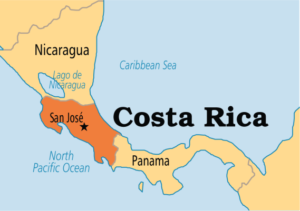
Republic of Costa Rica
Latin America
Geography
Area: 51,100 sq. km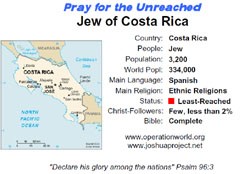
Agriculturally and ecologically rich land that straddles the Central American isthmus.
Population: 4,639,827 Annual Growth: 1.40%
Capital: San José
Urbanites: 64.3%
HDI Rank: 54 of 182 (UN Human Development Reports 2009)
Peoples: 21 (5% unreached) All peoples
Unreached Peoples Prayer Card
Official language: Spanish. English and Mekitelyu spoken on Caribbean coast Languages: 13 All languages
Religion
Largest Religion: Christian
| Religion | Pop % | Ann Gr | |
| Christians | 4,358,653 | 93.94 | 1.3 |
| Evangelicals | 688,771 | 14.8 | 3.7 |
Answer to Prayer
The sustained and large-scale growth of evangelicals from 2.5% in 1970 to 15% in 2010. Some reckon as many as 25% to be of evangelical persuasion, but these higher numbers cannot be substantiated by denominational statistics. One of Latin America’s most effective mission advances was established on this foundation.
Challenges for Prayer
Evangelical churches lose almost as many as they gather. Many unattached evangelicals and many more “ex-evangelicals” have returned to the catholic Church, turned to sects, or given up on religion all together. The following causes need to be addressed in prayer:
- A failure to disciple converts. Most Costa Rican churches are good at reaching out and winning converts, but they fail in raising them in godly lifestyles and biblical knowledge. When times get difficult, spiritually stunted Christians either fall away or migrate to a different church.
- Pastors are under-resourced, usually surviving on minimal incomes and without strong teams to help in the work. This generally leads to a failure to provide solid pastoral care for struggling believers, which in turn leads to members drifting away.
- Rivalry and divisions among and within denominations and congregations disillusion many. Pray for a spirit of unity and love to prevail.
- Rigid legalism and failure to enculturate the gospel forced alien forms of faith and culture onto Costa Rican Christianity. Pray for dynamic, relevant and culturally appropriate ministries and churches to spring forth.
The Roman Catholic Church is deeply impacted by charismatic renewal. Many have come to a living, personal faith in Christ, which has strengthened the Catholic Church (higher mass attendance, more indigenous seminarians and priests). Although 73% of the nation is Catholic, this percent declines every year, and most Catholics are quite nominal in their faith. From the charismatic renewal, many left the Catholic Church for evangelical churches; however, large and increasing numbers of “post-evangelicals” have returned to the familiarity and structure of Catholicism. Pray for both charismatics who stayed in the Catholic Church and those who have returned – may their faith bring further renewal.
PRAYER- Father, You know us inside and out. You knew us and saw us before we met You. You delight to make Yourself known to us through Your Son. Thank You that in Him we have an open heaven and access to Your Throne. We desire to do Your will in such a way that it is pleasing to You. You have saved us from the wrathful judgment we deserved and shielded us with favor. We revel in Your compassionate acceptance of us in Christ and we commit our lives afresh to You in His holy Name. Amen
– Pastor David
So, naturally, we proclaim Christ! We warn everyone we meet, and we teach everyone we can, all that we know about him, so that, if possible, we may bring every man up to his full maturity in Christ. (Colossians 1:28, J.B. Phillips paraphrase)
New Life Community Church,
221 Baker Ave. Concord, MA 10742
www.newlife.org
